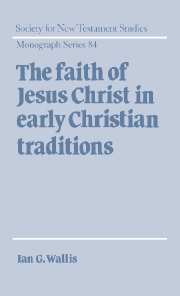Book contents
- Frontmatter
- Contents
- Preface
- Convention for referring to primary and secondary literature
- List of abbreviations
- 1 Setting the scene
- 2 Jesus' faith in the Synoptic Gospels
- 3 Jesus' faith in the Pauline Epistles
- 4 Jesus' faith in the deutero-Pauline and Pastoral Epistles
- 5 Jesus' faith in Hebrews and Revelation
- 6 Jesus' faith in extra-biblical sources
- 7 Concluding remarks
- Select bibliography
- Index of modern authors
- Index of passages
- Index of subjects
5 - Jesus' faith in Hebrews and Revelation
Published online by Cambridge University Press: 22 September 2009
- Frontmatter
- Contents
- Preface
- Convention for referring to primary and secondary literature
- List of abbreviations
- 1 Setting the scene
- 2 Jesus' faith in the Synoptic Gospels
- 3 Jesus' faith in the Pauline Epistles
- 4 Jesus' faith in the deutero-Pauline and Pastoral Epistles
- 5 Jesus' faith in Hebrews and Revelation
- 6 Jesus' faith in extra-biblical sources
- 7 Concluding remarks
- Select bibliography
- Index of modern authors
- Index of passages
- Index of subjects
Summary
The Epistle to the Hebrews
The Letter to the Hebrews furnishes us with the most explicit references to Jesus' faith in the New Testament. Pride of place goes to the description of Jesus as τὸν τῆς πίστɛως ἀρχηγὸν καὶ τɛλɛιωτήν in Hebrews 12.2, which is supported by mention of him as πιστὸς ἀρχιɛρɛύς in 2.17 and, as we shall see, 3.2 and 6. We shall attempt to examine these passages in relation to key lines of christological and soteriological thinking developed by the author in response to the pastoral situation addressed by the letter.
Jesus as Πιστός (Hebrews 2.17, 3.2 and 6)
The comparison between Jesus and the angels at the outset of the epistle (1.4–14) is followed by one involving Jesus and humanity (2.10–3.6); whereas the former establishes Jesus' ultimate superiority, the latter stresses his total identification with mortal flesh through incarnation. Almost from the beginning, therefore, the author underlines the importance of Jesus' earthly existence and, as we shall see, this dimension is of central importance for much of what follows. Jesus' humanity is taken up first of all in relation to his high-priestly function. Through his incarnate life, he shares in the common lot of all (2.11, 14, 17). He experiences suffering (2.10, 18) and temptation (2.18; 4.15). He learns obedience and, through these things, becomes perfect (2.10; 5.8–9). Whilst he was God's son before creation (1.2, 5–6; 5.5), Jesus has to become a high priest (2.17; 5.7–10).
- Type
- Chapter
- Information
- The Faith of Jesus Christ in Early Christian Traditions , pp. 145 - 174Publisher: Cambridge University PressPrint publication year: 1995
- 1
- Cited by



